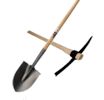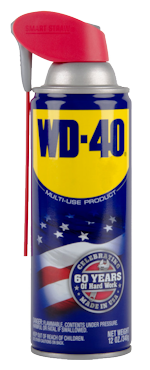Scraping off major dirt from garden tools after each use is just a start; it is also important to complete the process with a second step, washing or somehow cleaning off the remaining dirt and grime. There are at least two different approaches to doing this. We will look at both.
Washing Tools
Many people like to wash off their tools with water. Often they use a hose and perhaps a spray nozzle. You may want to do this, at least at times.
Water =
RUST!
Cleaning is essential to get into the crevices of many tools where your scraper will not reach, even if you are using something like a painter’s tool. Washing them off with water, especially under pressure as from a hose, is the easiest way to get the dirt off.
The biggest problem with washing is an obvious one. Water plus metal equals rust. And rust is a serious problem with your garden tools because just using them in the garden already exposes them to moisture.
Personally I avoid washing as much as possible. Nevertheless, sometimes it seems almost unavoidable.
If and when you do choose to wash your garden tools, be certain to dry them carefully and apply some sort of moisture protection (oil of some sort) to help prevent rust.
Cleaning With Oil and Rags
In most cases, it is almost as easy and it is just as effective to finish the cleaning process with an oil and rag method.
It is just a matter of doing a good scraping job so the residue is not extensive and having the right supplies on hand to finish the job. Two things are required: the correct kind of oil and the right kind of rag.
The best kind of oil is a penetrating oil with the correct viscosity and in a form that is easy to apply. One that is readily available is WD40. There is one with a straw like extension on the spray can which makes for easy and precise application.
The right rag to use is one with a finer weave. My personal choice is to cut up old tee shirts. Recycling is always a good idea.
If you spray liberally and wipe off with a rag you can almost always get off any remaining dirt after scraping. This is my preferred method of cleaning.
Final Cleaning Tips
Whenever possible, I recommend avoiding the use of water. At times it may be necessary, but I find that it is rarely required.
Keep on hand a couple of brushes and use them to clean off any smaller particles of dirt left after scraping and wire brushing before cleaning with the rags and oil. I use a small scrub brush which has a handle on it and sometimes a nail brush or old tooth brush on pruner joints.
The goal is to have as little grime left as possible before wiping with the oily rag. This eliminates any need to wash with water most of the time, leaving a perfectly cleaned tool.

